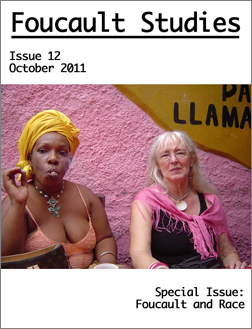From ‘Entrepreneur of the Self’ to ‘Care of the Self’: Neo-liberal Governmentality and Foucault’s Ethics
DOI:
https://doi.org/10.22439/fs.v0i12.3338Abstract
In his 1979 lectures, Foucault took particular interest in the reconfiguration of quotidian practices under neo-liberal human capital theory, re-describing all persons as entrepreneurs of the self. By the early 1980s, Foucault had begun to articulate a theory of ethical conduct driven not by the logic of investment, but of artistic development and self-care. This article uses Foucault’s account of human capital as a basis to explore the meaning and limits of Foucault’s final published works and argues for two interrelated genealogical projects focused on the ethics of economic activity.Downloads
Published
2011-09-12
How to Cite
Dilts, A. (2011). From ‘Entrepreneur of the Self’ to ‘Care of the Self’: Neo-liberal Governmentality and Foucault’s Ethics. Foucault Studies, (12), 130–146. https://doi.org/10.22439/fs.v0i12.3338
Issue
Section
Articles
License
Authors retain copyright to their work, but assign the right of the first publication to Foucault Studies. The work is subject to a CC BY-NC-ND 4.0 license, but despite these restrictions, authors can take for granted that Foucault Studies will permit articles published in Foucault Studies to be translated or reprinted in another format such as a book providing a full reference is made to Foucault Studies as the original place of publication.



